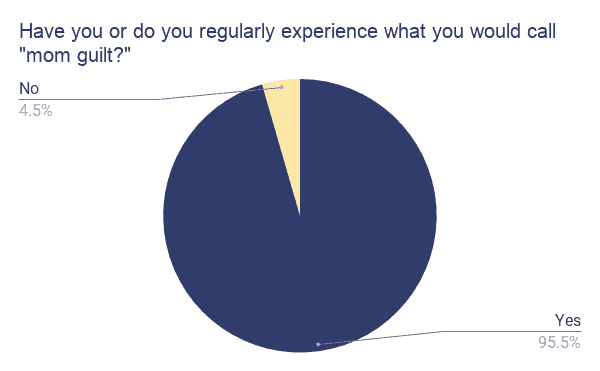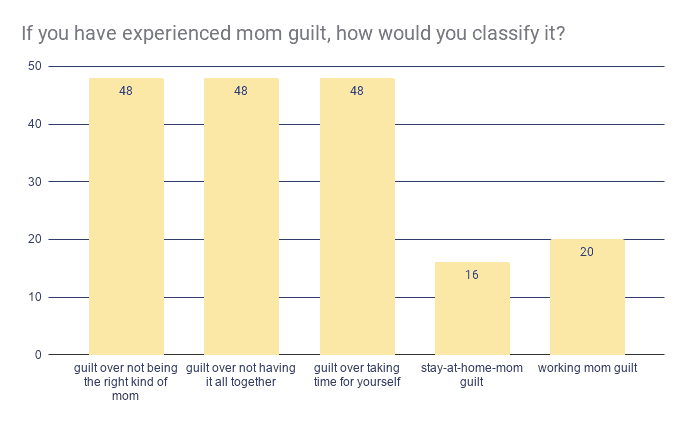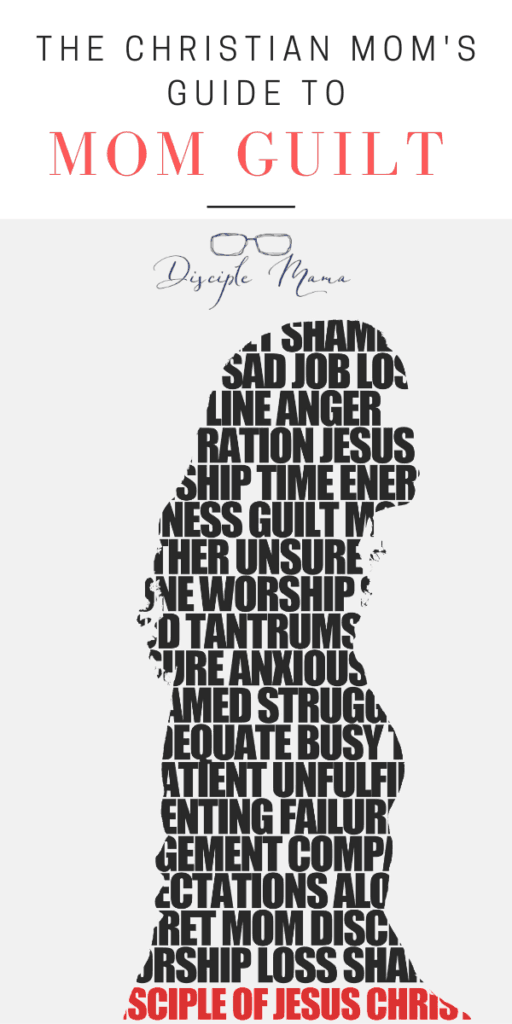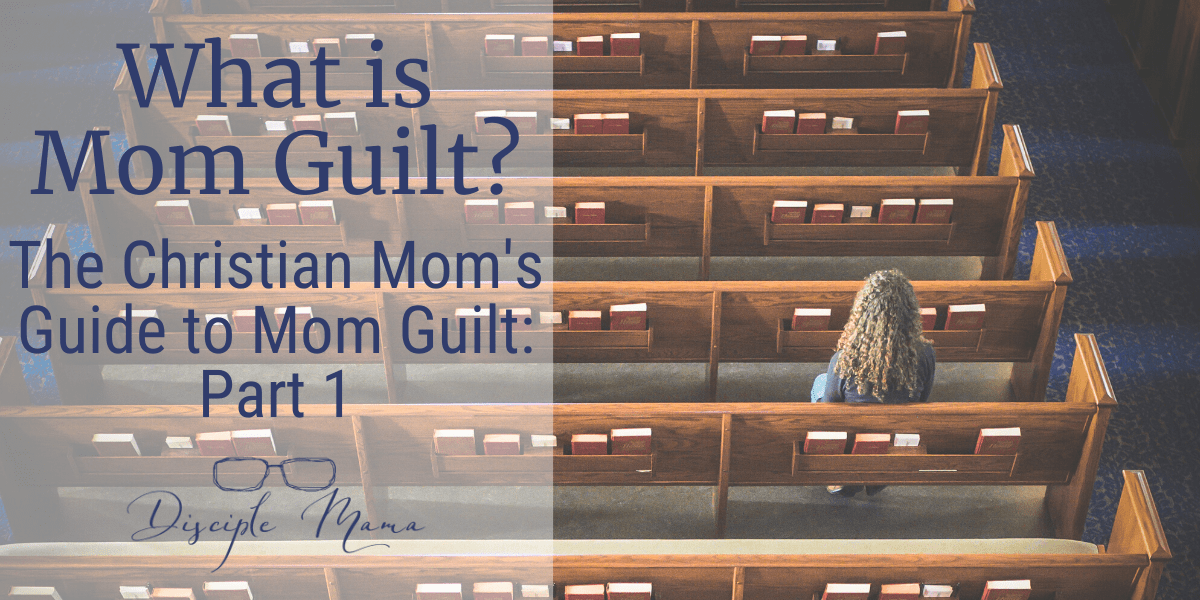What is Mom Guilt?
Mom guilt
Mom guilt is not something I really put much thought into until recently. I am co-leading a small group on parenting at my church, and one of the topics we explored a few weeks ago was mom guilt, just because it kept coming up, and it seemed like it was worth digging into a little bit. Well, doing that little study on mommy guilt really going me thinking, and I realized that so much of the stuff I’ve been carrying around with me since becoming a parent falls into this mom guilt category.
I decided to write a short little devotional post to encourage moms, but when I sat down to actually find the words, I realized I wanted to know a lot more about what aspects of mom guilt that my readers/friends/peers are struggling with. So, I thought I’d send out a quick little survey so a few people might give me some insight. Well, 67 responses and 2 weeks later, I finally have the first part of what has turned into a small series on mom guilt ready for you.
Welcome to The Christian Mom’s Guide to Mom Guilt, Part 1–we’re going to dive into what mom guilt looks like and how to tell the difference between guilt and shame (and why that’s important.
Disclaimer: I am not a medical professional, and this post is for informational purposes only. If you are struggling with guilt or shame that you just can’t shake, please, please go talk to your doctor, your therapist, or another professional who can help you.
This post contains affiliate links, which means that if you click through and make a purchase, I may receive a small commission at no additional cost to you. You can read my full disclosure here (if you feel like it).
What is mom guilt?
Mom guilt is guilt that mothers experience as a result of feeling inadequate. Mom guilt comes in about a zillion flavors, and it’s affected by just as many variables.
For some mamas, mom guilt starts up in pregnancy and doesn’t really ever let up. For others, it seems to come and go, based on how smoothly things are running.
Mommy guilt can be a self-compounding issue, because sometimes we feel so crippled by our guilt that we have an even harder time dealing with things that we’re feeling bad about not keeping up with or being enough for.
Is mom guilt for real?
I recently sent out a survey about mommy guilt to the Christian mamas I am connected to on social media, and invited them to share it with their mom friends, as well. So far, I’ve received 67 responses, and though my research is very informal, and the sample size is small, it’s clear that most of us (more than 95% of those who responded to me) are experiencing or have experienced mom guilt regularly.
**The graphs and charts you see in this post are all from the results of my survey, unless otherwise labeled.**
 So, is mom guilt real? The short answer? Yes.
So, is mom guilt real? The short answer? Yes.
The longer answer is really long, but here’s a summary: researchers (as well as pretty much all other people) have noticed symptoms of mom guilt for a long time now. Anything a mom does OR doesn’t do can be a potential source of mom guilt.
I realize that all of this sounds very dramatic, and we have positive interactions with moms all the time, so how could so many possibly be experiencing this mommy guilt phenomenon?
Honestly, for me, at least (and for many of the amazing mothers that I know and love), the whole mom guilt thing is pretty quiet. It runs in the background. It’s not something that we sit around thinking about consciously and constantly.
But for many of us, it’s there. It flares up when we’re worn down, when the house is a wreck and we can’t see how we can possibly make it stay any better. It rears its ugly head when we snap at our kids instead of responding patiently to them. It slips into our thoughts as we lie awake at night, reviewing the day’s not-done list, or in the early mornings when we wake up before our kids in a desperate attempt to get just half a step ahead.
Mom guilt assails us when we’re scrolling through our Instagram feeds, taking in snapshot after snapshot of curated moments of smiling families framed in spotless environments.
It gets us when we struggle to balance the budget and think it might have been a mistake to become a stay-at-home mom. And it stings us when we drop our kids off at daycare before sunrise and don’t pick them up again until dinner time, because time with our children is more important than having a career, right?
Even you moms that have all the stuff together that I don’t are at risk–your home is immaculate, your kids are eating organic, no-sugar-added, 27 servings of veggies a day diets, and you’re always on time with your hair done and more than one choice of clean socks–but maybe the time it takes to do all that means you deal with a nagging feeling that you’re not spending enough time actually PRESENT with your kids.
What Causes Mom Guilt?
There are so many sources of mommy guilt that I’d never be able to list them all, but let’s look at some of the types of guilt that Christian moms (and moms in general) frequently mention:
Stay-at-home-mom guilt
Being a stay-at-home-mom (SAHM) is a decision that’s trending upward since 1999, according to the Bureau of Labor Statistics (BLS). The BLS reports that in 2012, about 28% of children in the US were being raised by SAHMs. Moms who choose to stay at home do so for many different reasons, but most of the reasons boil down to one thing: they believe it’s the best decision for their children and their family.
So, what’s stay-at-home-mom guilt?
- Guilt over having the economic means to stay home when other moms who would like to can’t afford it
- Guilt over not using their hard-earned (and expensive) degrees and/or pursuing their careers
- Guilt over being home all day and still not being able to keep up with household chores
- Guilt over wishing to be able to go to work instead of wanting to be home with the kids
- Guilt over ‘just being at home’ while spouses/partners ‘work hard all day’
- Guilt over not being able to afford things because living on one income is tight
You get the idea.
Working mom guilt
Working moms (in this post specifically meaning mothers who work outside the home) are pretty much the norm these days, but working moms still have their fair share of the mommy guilt pie.
- Guilt over leaving children with a childcare provider (even if it’s the coparent)
- Guilt over valuing a career over family time
- Guilt over not having enough time in the day to keep up with household tasks
- Guilt over not being able to attend kids’ events, chaperone field trips, etc.
- Guilt over not spending enough time with kids/spouse
- Guilt over work not being performed at the highest standards because of family demands
 Work-at-home-mom guilt
Work-at-home-mom guilt
Another important category, with one foot in each of the worlds of SAHMs and working moms, is the work-at-home moms (WAHMs). WAHMs experience a sampling of guilt from the SAHM and working mom lists.
This came up in the survey I sent out. An entrepreneur mom wrote, “WAHM guilt is a thing! I’m home with my kids, but I work from home too, and we homeschool. So it’s hard to carve out specific niches of time for play, self-care, etc.”
Another mom who took my survey put it this way: “My biggest struggle is trying to start a business while also being a stay at home mom. I feel guilty that I am not giving my children as much attention as they deserve.”
A third mom said that her biggest mom guilt struggle is, “working at home & having to let him play by himself instead of spending time together always.”
Self-Care Guilt
Self-care is such a huge buzzword right now, and we know it’s important. But, if you’re anything like me (and a lot of moms I know), you KNOW how important it is to take time for yourself, but knowing it and doing it are two very different things. Some of us not only struggle to take the time to ourselves, but also struggle with guilt when and if we do (and sometimes we feel guilty for even just WISHING for some “me” time).
- Guilt over leaving children with a childcare provider (even if it’s a family member or coparent) to go on a date, work out, get a haircut, etc.
- Guilt over wanting time to yourself without your kids (and maybe even without your spouse) around
- Guilt over enjoying your time without kids
- Guilt over spending money or using time just for yourself when it could go toward your kids
Christian Mom Guilt
On top of the other types of guilt all moms are prone to experiencing, many Christian moms worry about how well they’re modeling Christian ideals to their kids.
- Guilt over not always being a good Christian example to children
- Guilt over kids leaving the church or not wanting a relationship with Jesus
- Guilt over not creating enough of a spiritual environment in the home
General Mom Guilt
Of course, there are a lot of mom guilt issues that pop up across the board, regardless of whether we’re working for a living, staying home, Christian, or not.
- Guilt over not wanting to play with kids
- Guilt over being too tired or busy from other tasks to spend quality time with kids
- Guilt over not giving spouses enough attention because of all the attention given to kids
- Guilt over losing one’s temper
- Guilt over not enjoying time with kids
Mom guilt or mom shame?
Digging deeper into this topic has led me to realize that sometimes what I’ve classified as “mommy guilt” in my own mind is really something else: mom shame.
So what’s the difference between guilt and shame? I’m not a psychologist, but I’ve waded through some descriptions of the differences, and I managed to find this chart from the National Institute for the Clinical Application of Behavioral Medicine (NICABM) that really sums up the difference between guilt and shame nicely (and clearly–for those of us who don’t study this on a regular basis).
One thing I really like about this information from the NICABM is that it brings out the idea that there is a difference between healthy guilt and unhealthy guilt. Distinguishing between the two is pretty important for handling our mommy guilt in a productive way.
Healthy guilt
Healthy guilt, or helpful guilt, is guilt that we feel over something wrong we have done based on an objective view of the matter. Healthy guilt is helpful because it motivates us to make things right and change behaviors that we (usually) can and definitely should change.
Example: I promised my child I’d read him a story before his nap today, but then I got stressed about the dirty dishes and told him I didn’t have time. He is hurt and disappointed.
Healthy guilt looks like this:
- Realizing I was wrong to break my promise to my child and prioritize the dishes over keeping my word and respecting his trust in me.
- Being motivated to apologize sincerely and make amends. I might spend an extra few minutes snuggling with him after nap time and reading a couple of books after I apologize to him for breaking my promise.
- Understanding that this mistake doesn’t define me as a mother. I am a good mom, but I made a bad call. I’ll work to do better next time.
- Forgiving myself and being able to move on. I spend time in prayer, give it to God, and I trust Him when He says that He will not remember my sins (Isaiah 43:25) If God won’t remember this, why should I hang on to it? I let it go, and have faith that He will help me do better moving forward.
Unhealthy Guilt
Unhealthy, or unhelpful, guilt is feeling bad about something we have done that we may not have realistically been able to do differently, or about something that we wouldn’t think someone else should feel guilty about if they’d done it. Unhealthy guilt is not helpful, because rather than motivating us toward making amends or changing our behavior in a positive way, we tend to fixate on what we did wrong and punish ourselves repeatedly for it.
Let’s look at a similar example.
Example: I usually read my child a story before his nap, but today I had a medical appointment and had to leave him with a sitter. I forgot to mention the pre-nap story to her, and she didn’t read to him. He was upset with her for not reading, and angry with me for forgetting to include the story in my instructions.
Unhealthy guilt looks like this:
- Beating myself up over it. How could I have forgotten to tell the sitter about something that I do every day? Why didn’t I write out the routine instead of just telling her verbally? I knew I never should have left him with someone different for naptime!
- Thinking irrationally. I hold myself up to the unrealistic standard of always relating the day’s routines comprehensively and without mistakes when I have a sitter. I fall short, and I don’t move past it because I don’t take steps toward seeking forgiveness from my son or forgive myself. I punish myself for messing up by not hiring a sitter so I can go to an appointment on my own (or anything else) again.
- Making the situation worse over time. I’m more and more unhappy because I hang on to all of my parenting missteps, so I make more and more mistakes and fail even more often to live up to my unrealistic standards for myself.
Until I accept the fact that sometimes I’ll forget things, and it’s okay for the routine to vary a little bit (especially when there’s a sitter involved), I won’t be able to shake my unhealthy guilt.
Shame
Shame is the feeling that we are messed up to the core, deficient, and inadequate. Shame is less about our actions or behaviors, and more about how we feel, deep down, about ourselves as mothers, and as people.
Honestly, an example is kind of irrelevant here, because shame isn’t really based on anything you DO, it’s based on how you feel about yourself.
Shame looks like this:
- Disconnecting from (or at least not fully engaging with) others. Avoiding any situation in which I will have to come to terms with whatever I’m feeling shame about. I don’t share my feelings with much of anyone, because I’m afraid of what they’ll think about me. I don’t think I’m a good mom, so I don’t need anyone else judging me.
- Shaming others. I may hide from my shame by shaming the people around me. My spouse/partner may feel shame because of the way I attack them to make myself feel or appear better. I may blow up in anger when I feel threatened that someone may discover the source of my shame.
- Sadness and/or depression. Shame can lead me to devalue myself to the point of overwhelming depression, which can, in turn, make it harder for me to parent and function in general.
Now I know what kinds of guilt or shame I’m experiencing. What’s next?
Well, chances are, if you’re feeling healthy guilt over something you’ve done, you know what you need to do next. Ask for forgiveness, make amends in the way that makes the most sense, pray for assistance in resisting the urge to make the same mistake again next time, and move on!
If you’re feeling unhealthy guilt, go and read 2 Corinthians 12:9 and be reminded that God’s grace really is enough for you, and that our weakness is actually made into a blessing WHEN (and only when) we lean into His grace. Then, His strength shines brightly in our lives as He fills the gaps.
With 2 Corinthians 12:9 in mind, take some time to distinguish between the realistic and unrealistic expectations you have for yourself.
While you are working on this, please remember that what you could realistically accomplish at one point in your life may no longer be a reasonable expectation for yourself right now.
8-9 years ago I was a twenty-something career woman with no spouse or children to worry about. What I could accomplish in a given day during that time is very different from what I can realistically accomplish now–with a husband to be a partner to and 2 kids to run around and clean up after. And let’s not even mention the difference between my well-rested young adult brain and my coming-up-on-40 night-waking-for-4-years mommy brain.
Once you realize that your expectations for yourself in some areas, at least, are too high, you can start to forgive yourself and move on. God gives us grace upon grace upon grace, right? If He gives us grace in spite of all of His perfection and all of our human inadequacies (John 1:16), we certainly have no reason to withhold grace from ourselves.
For those of you feeling shame, I’d encourage you to do the opposite of what many of us actually FEEL like doing.
Talk to someone about it.
Brene Brown says it this way in her book, The Gifts of Imperfection,
“Shame hates it when we reach out and tell our story. It hates having words wrapped around it- it can’t survive being shared. Shame loves secrecy. When we bury our story, the shame metastasizes.”
 You may not want to talk about it. I know I didn’t want to open up about the things I’ve been feeling ashamed of in recent months. But, you know what? I’ve started talking about them and I’ve discovered that, even though it was really, really hard at first, talking about it makes it easier to bear.
You may not want to talk about it. I know I didn’t want to open up about the things I’ve been feeling ashamed of in recent months. But, you know what? I’ve started talking about them and I’ve discovered that, even though it was really, really hard at first, talking about it makes it easier to bear.
First, I talked to my husband about the ways and the reasons why I was feeling inadequate and unworthy as a mom and as a wife. It was so hard to do, even though I know without a doubt that he loves me inside and out. I was afraid of so many things: What if I shattered the great image he had of me and disappointed him? What if he confirmed all those awful things I was feeling about myself? What if he was ashamed of me too?
What I discovered was that (of course) he’d already known something was up with me. But, he reassured me that he’s right here in this with me, and though he didn’t (and can’t) cure me of my shame, he’s loving me fiercely right through it.
From there, I’ve been able to take the next step and talk to a professional about it. I’m still not totally free of my shame, but my doctor was able to tell me that I am not alone and what I’m feeling is not “normal mom stuff” but it is “common mom stuff.” There’s an important difference. It actually felt like such a relief to hear that from my doctor, a person who doesn’t have a personal relationship with me.
Please, even if you talk to no one else about your shame, talk to your doctor. Make sure they listen to you and if they can’t help you, ask for them to send you to someone who can.
We will be more effective disciple-makers when we stop listening to our guilt and shame telling us that we are not enough.
Mom guilt doesn’t have to be part of your identity.
Shining a little bit of light into the dark corners of the parts of myself that I’ve been trying to hide for the past few months or years since becoming a mom is starting a slow transformation back to truly seeing myself as someone created in the image of God.
In my next post, How to Deal with Mom Guilt, I share practical, doable strategies for conquering mom guilt and leaving shame behind. Sign up to receive my newsletter so you won’t miss it! I’m sharing everything I’m learning about overcoming unhealthy mom guilt and shame with you in this series, because even though it’s only there running quietly in the background (for most of us), the fact that it’s there at all is a barrier to the joyful Christian life that God intends for us to live. The bottom line is that we will be more effective disciple-makers when we stop listening to our guilt and shame telling us that we are not enough, instead of going all in with that still, small voice that tells us, “I have redeemed you, I have called you by name, you are mine.”
Did you enjoy this post? Check these out!
Teach by Example, Flaws and All



Thank you for auch an in-depth article. I had not thought about Mom guilt much, but I know I experience it. How I reaction and respond to it usually depends on how well-rested or sleep-deprived I am at the moment. Looking back, there are some things I wiscou could have done differently bit even knowing then what I know now, many of the contributing factors were out of my control. So the outcome would have been similar no matter what.
Thanks Jacquelyn! It’s interesting how we can experience mom guilt without really even thinking about it much or questioning it, isn’t it? I agree with you about how our reactions and responses depend a lot on our physical well-being, which is one reason why self-care is so important for mamas! We can’t control many factors that contribute to our mom guilt, but by being intentional (and by enlisting help) we can either take it in as healthy guilt and use it to inspire change, or we can reject that guilt by keeping our expectations of ourselves more realistic. Thank you so much for your thoughts and for visiting the site again today! I always enjoy your feedback.
Thank you so much for clarifying the difference between shame and guilt, and healthy guilt versus unhealthy guilt!!
You are so right about it “running in the background”, until I took your survey I had never really realized how much it occurred!!
Thank you so much for looking into all of this, and sharing your thoughts. I’m excited to go read part two 😁